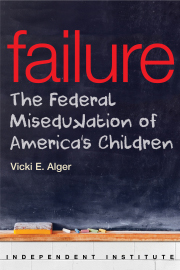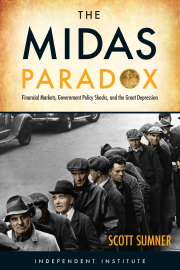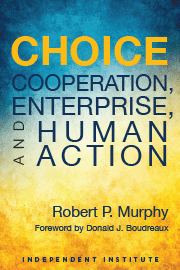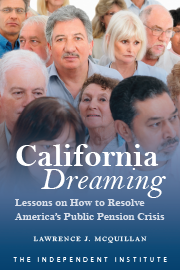Robert Higgs • Monday, December 18, 2017 •
 In discussing the economy and especially economic policy, mainstream economists have been in love with optimality for a century or so. They have built many mathematical models from which they have derived conditions related to optimal tariffs, optimal population, optimal money supply, optimal taxation, optimal subsidies, and so forth. Indeed, for talking about the overall economy, their criterion of efficiency is something called Pareto optimality.
In discussing the economy and especially economic policy, mainstream economists have been in love with optimality for a century or so. They have built many mathematical models from which they have derived conditions related to optimal tariffs, optimal population, optimal money supply, optimal taxation, optimal subsidies, and so forth. Indeed, for talking about the overall economy, their criterion of efficiency is something called Pareto optimality.
By now, probably thousands of articles have been published in economics journals in which the author constructs an economic model, derives from it the optimality conditions, and concludes by making policy recommendations that prescribe how governmental authorities should act—that is, should use their coercive power—to force the real world into conformity with the model’s optimality conditions.
All this—above all, the policy recommendations—is for the most part an enormous waste of time and intellect.
Adam Summers • Monday, December 18, 2017 •
 Properly planning, and saving for, one’s retirement is certainly a worthy goal, but, like many other things, it can become corrupted by heavy-handed government meddling. Last year, the Legislature, and Gov. Jerry Brown, enacted Senate Bill 1234, which establishes the California Secure Choice Retirement Savings Program, a mandatory automatic retirement savings program administered by the state for private-sector workers who work for an employer with five or more employees that does not offer its own retirement plan. The California Chamber of Commerce, which dropped its opposition to the bill and remained neutral after provisions explicitly shielding employers from liability were incorporated, recently urged business to participate in workshops regarding proposed regulations for the program.
Properly planning, and saving for, one’s retirement is certainly a worthy goal, but, like many other things, it can become corrupted by heavy-handed government meddling. Last year, the Legislature, and Gov. Jerry Brown, enacted Senate Bill 1234, which establishes the California Secure Choice Retirement Savings Program, a mandatory automatic retirement savings program administered by the state for private-sector workers who work for an employer with five or more employees that does not offer its own retirement plan. The California Chamber of Commerce, which dropped its opposition to the bill and remained neutral after provisions explicitly shielding employers from liability were incorporated, recently urged business to participate in workshops regarding proposed regulations for the program.
Raymond March • Thursday, December 14, 2017 •
 MDMA, more commonly called “ecstasy” or “Molly,” is an illicit substance often taken to induce euphoria. The Controlled Substance Act considers MDMA a Schedule 1 controlled substance, which has no known medicinal benefits and a high likelihood of abuse.
MDMA, more commonly called “ecstasy” or “Molly,” is an illicit substance often taken to induce euphoria. The Controlled Substance Act considers MDMA a Schedule 1 controlled substance, which has no known medicinal benefits and a high likelihood of abuse.
Penalties for using or distributing MDMA are considerably high even for a Schedule 1 substance. In 2001, the U.S. federal government increased penalties for people convicted of dispensing over 50 grams of MDMA to a four-year prison sentence and up to $4 million in fines. These penalties could double if the buyer was harmed from the exchange. Similarly, possessing 5 grams of MDMA can result in a prison sentence ranging from 4 to 50 years.
Raymond March • Wednesday, December 13, 2017 •
 On November 13, millions of Americans had high blood pressure for the first time. It wasn’t even Thanksgiving.
On November 13, millions of Americans had high blood pressure for the first time. It wasn’t even Thanksgiving.
That day the American College of Cardiology (ACC), working with the American Heart Association (AHA), released new guidelines regarding what constitutes high blood pressure. Since 2003, a reading below 140/90 was considered normal. Now, any blood pressure over 120/90 is considered hypertension.
These changes mean nearly half of Americans have high blood pressure, a considerable increase from about 30 percent under the old guidelines. If hypertension rates before these changes were described as an epidemic and a silent killer, the new rates will likely replace the silence with alarm and calls to action.
As a first call to action, authors from the AHA and the ACC also provided new recommendations monitor and treat hypertension, which include emphasizing a “team approach,” stress management, self-monitoring equipment, more educational materials, and drastic dietary changes.
But how are these changes going to be implemented? Historically, efforts to combat public health problems eschew competition in the market in favor of using the political process.
These most recent changes are no exception. Both the ACC and the AHA openly advocate using government to advance their interests. According to the Center for Responsive Politics, in 2016 both organizations spent just under $3 million to lobby the federal government.
Robert Higgs • Tuesday, December 12, 2017 •
 “The personal is political” is a slogan that has been around for a long time, used especially though not exclusively by radical feminists. In practice it has served as an exhortation that people make ideology the sole dimension of their personal identity, that they set aside all other bases on which to evaluate their relations with other people and order their conduct even in their most intimate dealings with others. (Here is a recent example so perfect it seems like a caricature.)
“The personal is political” is a slogan that has been around for a long time, used especially though not exclusively by radical feminists. In practice it has served as an exhortation that people make ideology the sole dimension of their personal identity, that they set aside all other bases on which to evaluate their relations with other people and order their conduct even in their most intimate dealings with others. (Here is a recent example so perfect it seems like a caricature.)
To carry on one’s life in accordance with such an exhortation is a recipe for endless misery. The misery comes from the entailed sacrifice of the countless opportunities for connecting fruitfully with others through, for example, family relations, friendships, comradeship, and partnerships based on non-ideological commonalities such as neighborhood, shared artistic appreciation, and participation in team efforts in sports and other activities.
The permanence of the misery comes from the nature of politics, which is an endless struggle that, as many mad ideologists in power have demonstrated all too well, can be terminated only by death. Politics is, among other things, a war that cannot be won unless all one’s ideological opponents are slaughtered and their ideas somehow suppressed so deeply that they too have been destroyed. This latter, however, is a result that even the most ruthless ideologue in the political saddle is unlikely to achieve. As the saying goes, you can’t kill an idea. Even if you kill everyone who now embraces an idea, the idea itself lies dormant, waiting for someone to rediscover and embrace it in the future.
“The personal is political,” if taken in the sense that everything about a person must be forced into the Procrustean Bed of an ideology, guarantees a life of bleak, endless, and futile struggle, which is all the more tragic because it was never necessary or wise in the first place.
* * *
Robert Higgs is Senior Fellow in Political Economy at the Independent Institute. His most recent book is Taking a Stand: Reflections on Life, Liberty, and the Economy.
Robert Higgs • Monday, December 11, 2017 •
 In the late nineteenth century, many Americans took pride in living in a country that boasted so much freedom. In describing their society and polity, they often contrasted them with what they called paternalism, which they believed was the rule in certain European countries, such as Germany, where a proto-welfare state began to be developed as early as the 1880s and became a beacon for Americans who disliked the high degree of personal freedom in the USA and wished to replace it with various forms of government dictation and direct participation.
In the late nineteenth century, many Americans took pride in living in a country that boasted so much freedom. In describing their society and polity, they often contrasted them with what they called paternalism, which they believed was the rule in certain European countries, such as Germany, where a proto-welfare state began to be developed as early as the 1880s and became a beacon for Americans who disliked the high degree of personal freedom in the USA and wished to replace it with various forms of government dictation and direct participation.
So, in the late nineteenth century, despite the prevailing embrace of freedom, a growing group Americans set out, slowly and haltingly at first, to put their own forms of paternalism in place, beginning with campaigns against alcohol and tobacco, proceeding to mandatory-school-attendance, anti-child-labor, and women’s working-hours laws, and continuing until today, when governments seek to prohibit even forms of speech that some people dislike and perceive as harmful and to punish parents for letting children get out of their sight even in safe circumstances. Compared to the German paternalism of a century or more ago, the American paternalism of today extends much more broadly and deeply into social and political life, and its march shows no sign of losing momentum.
William Shughart • Thursday, December 7, 2017 •
 As 2017 was rushing to its end, the U.S. House and Senate passed different versions of income tax reform legislation, one of the Trump Administration’s top policy priorities. If a reconciled bill emerges from conference committee and is approved by majorities in both chambers of Congress before year’s end, the legislative effort would fulfill the president’s promise to oversee the first significant change to the U.S. income tax code since Ronald Reagan occupied the White House.
As 2017 was rushing to its end, the U.S. House and Senate passed different versions of income tax reform legislation, one of the Trump Administration’s top policy priorities. If a reconciled bill emerges from conference committee and is approved by majorities in both chambers of Congress before year’s end, the legislative effort would fulfill the president’s promise to oversee the first significant change to the U.S. income tax code since Ronald Reagan occupied the White House.
At the time of this writing, no one knows the devilish details of the final tax reform law, if it is in fact passed in time to take effect before a new tax season begins on January 1, 2018. Nevertheless, it is important to recognize that, no matter how well-intentioned and how consistent with the principles of public finance 2017’s tax reform attempt may be, the law’s provisions ultimately will be influenced heavily by a political process that is sensitive to the influence of well-organized special interest groups. Tax reform inevitably creates winners and losers.
Abigail R. Hall • Thursday, December 7, 2017 •
 Social media never fails to create drama.
Social media never fails to create drama.
Several months ago, an acquaintance on Facebook posted a video discussing France’s new law regarding organ donation. Specifically, the French government revised its policies on organ donation such that everyone is considered an organ donor upon their death unless they officially opt out of the program. As of January 2, 2017, only 150,00 people had opted out of the registry. (For perspective, France has about 41 million adults between the ages of 15 and 64.)
Indeed, the shortage of transplantable organs is a very real one. According to Donate Life America, an organization that encourages people to register to become organ donors, some 120,000 in the United States are waiting for an organ. Another person is added to the waiting list every 10 minutes and 22 people die each day waiting for a transplant that will never come. The organization says that while 95 percent of Americans are in favor of organ donation, only 52 percent are registered donors.
Since I’m often incapable of making good choices regarding sharing controversial material on social media, I shared the video. The reaction was about what you’d expect. Some of my friends were horrified at the idea of not having control over what happens to their remains. Others stated that such laws were only forcing people to make good decisions and that such mandates were positive in that people “too lazy” to check a box would be automatic donors.
Robert Higgs • Wednesday, December 6, 2017 •
 Many Americans talk about “our country,” “our public lands,” and “our infrastructure.” Such terminology is inaccurate and misleading. Genuine de facto ownership entails control of the property and the benefits it generates. No one owns the country, though the thousands of governmental entities make and enforce claims to various parts and aspects of it. Local, state, and federal government bureaucracies own the so-called public lands and the infrastructure. In view of the incentives and constraints of these governmental entities, it is only to be expected that the properties will be misused and in many cases damaged or destroyed. After all, if the de facto owners destroy the value of the property, they bear no loss of personal wealth, and hence they have little incentive to avoid such ruination, especially if the mismanagement of resources somehow promotes their political or bureaucratic careers, which is often the case.
Many Americans talk about “our country,” “our public lands,” and “our infrastructure.” Such terminology is inaccurate and misleading. Genuine de facto ownership entails control of the property and the benefits it generates. No one owns the country, though the thousands of governmental entities make and enforce claims to various parts and aspects of it. Local, state, and federal government bureaucracies own the so-called public lands and the infrastructure. In view of the incentives and constraints of these governmental entities, it is only to be expected that the properties will be misused and in many cases damaged or destroyed. After all, if the de facto owners destroy the value of the property, they bear no loss of personal wealth, and hence they have little incentive to avoid such ruination, especially if the mismanagement of resources somehow promotes their political or bureaucratic careers, which is often the case.
You may imagine that because you paid taxes, obeyed laws, or carried out other duties laid on you by the various governmental entities, you have a rightful claim to partial ownership of public property. But these governments beg to differ with you, and they stand ready to back up their own claims as de facto owners with force and violence if need be.
In short, mis amigos, you don’t own squat—not the country at large, and not its public lands or infrastructure, either. Indeed, in a substantive sense you don’t even own your so-called private property, because you hold such property only subject to payment of stipulated property taxes and compliance with untold regulatory requirements. On this range, amigos, you are little more than a milch cow for your masters—and that’s not a mooot point.
* * *
Robert Higgs is Senior Fellow in Political Economy at the Independent Institute. His most recent book is Taking a Stand: Reflections on Life, Liberty, and the Economy.
Randall Holcombe • Wednesday, December 6, 2017 •
 The House and Senate have each passed their versions of a tax reform bill. Those bills now go to a conference committee consisting of members of the House and Senate to reconcile their (minor) differences so that both houses can vote on and pass the same bill. The conference committee is just a formality. The Republicans will have already ironed out the differences before the conference committee meets, and the committee will just rubber-stamp the Republican-designed tax reform. Democrats will have no say. Why?
The House and Senate have each passed their versions of a tax reform bill. Those bills now go to a conference committee consisting of members of the House and Senate to reconcile their (minor) differences so that both houses can vote on and pass the same bill. The conference committee is just a formality. The Republicans will have already ironed out the differences before the conference committee meets, and the committee will just rubber-stamp the Republican-designed tax reform. Democrats will have no say. Why?
The answer is partisan politics. Members of both parties will (mostly) vote with their parties because of pressure from the party leadership. That means Democrats will (almost surely) vote against the tax reform, so the Republican majority must get almost all their members to vote for it.
 In discussing the economy and especially economic policy, mainstream economists have been in love with optimality for a century or so. They have built many mathematical models from which they have derived conditions related to optimal tariffs, optimal population, optimal money supply, optimal taxation, optimal subsidies, and so forth. Indeed, for talking about the overall economy, their criterion of efficiency is something called Pareto optimality.
In discussing the economy and especially economic policy, mainstream economists have been in love with optimality for a century or so. They have built many mathematical models from which they have derived conditions related to optimal tariffs, optimal population, optimal money supply, optimal taxation, optimal subsidies, and so forth. Indeed, for talking about the overall economy, their criterion of efficiency is something called Pareto optimality.























 Properly planning, and saving for, one’s retirement is certainly a worthy goal, but, like many other things, it can become corrupted by heavy-handed government meddling. Last year, the Legislature, and Gov. Jerry Brown, enacted Senate Bill 1234, which establishes the California Secure Choice Retirement Savings Program, a mandatory automatic retirement savings program administered by the state for private-sector workers who work for an employer with five or more employees that does not offer its own retirement plan. The California Chamber of Commerce, which dropped its opposition to the bill and remained neutral after provisions explicitly shielding employers from liability were incorporated, recently
Properly planning, and saving for, one’s retirement is certainly a worthy goal, but, like many other things, it can become corrupted by heavy-handed government meddling. Last year, the Legislature, and Gov. Jerry Brown, enacted Senate Bill 1234, which establishes the California Secure Choice Retirement Savings Program, a mandatory automatic retirement savings program administered by the state for private-sector workers who work for an employer with five or more employees that does not offer its own retirement plan. The California Chamber of Commerce, which dropped its opposition to the bill and remained neutral after provisions explicitly shielding employers from liability were incorporated, recently  MDMA
MDMA On November 13, millions of Americans had high blood pressure for the first time. It wasn’t even Thanksgiving.
On November 13, millions of Americans had high blood pressure for the first time. It wasn’t even Thanksgiving. “The personal is political” is a slogan that has been around for a long time, used especially though not exclusively by radical feminists. In practice it has served as an exhortation that people make ideology the sole dimension of their personal identity, that they set aside all other bases on which to evaluate their relations with other people and order their conduct even in their most intimate dealings with others. (Here is
“The personal is political” is a slogan that has been around for a long time, used especially though not exclusively by radical feminists. In practice it has served as an exhortation that people make ideology the sole dimension of their personal identity, that they set aside all other bases on which to evaluate their relations with other people and order their conduct even in their most intimate dealings with others. (Here is  In the late nineteenth century, many Americans took pride in living in a country that boasted so much freedom. In describing their society and polity, they often contrasted them with what they called paternalism, which they believed was the rule in certain European countries, such as Germany, where a proto-welfare state began to be developed as early as the 1880s and became a beacon for Americans who disliked the high degree of personal freedom in the USA and wished to replace it with various forms of government dictation and direct participation.
In the late nineteenth century, many Americans took pride in living in a country that boasted so much freedom. In describing their society and polity, they often contrasted them with what they called paternalism, which they believed was the rule in certain European countries, such as Germany, where a proto-welfare state began to be developed as early as the 1880s and became a beacon for Americans who disliked the high degree of personal freedom in the USA and wished to replace it with various forms of government dictation and direct participation. As 2017 was rushing to its end, the U.S. House and Senate passed different versions of income tax reform legislation, one of the Trump Administration’s top policy priorities. If a reconciled bill emerges from conference committee and is approved by majorities in both chambers of Congress before year’s end, the legislative effort would fulfill the president’s promise to oversee the first significant change to the U.S. income tax code since Ronald Reagan occupied the White House.
As 2017 was rushing to its end, the U.S. House and Senate passed different versions of income tax reform legislation, one of the Trump Administration’s top policy priorities. If a reconciled bill emerges from conference committee and is approved by majorities in both chambers of Congress before year’s end, the legislative effort would fulfill the president’s promise to oversee the first significant change to the U.S. income tax code since Ronald Reagan occupied the White House. Social media never fails to create drama.
Social media never fails to create drama. Many Americans talk about “our country,” “our public lands,” and “our infrastructure.” Such terminology is inaccurate and misleading. Genuine de facto ownership entails control of the property and the benefits it generates. No one owns the country, though the thousands of governmental entities make and enforce claims to various parts and aspects of it. Local, state, and federal government bureaucracies own the so-called public lands and the infrastructure. In view of the incentives and
Many Americans talk about “our country,” “our public lands,” and “our infrastructure.” Such terminology is inaccurate and misleading. Genuine de facto ownership entails control of the property and the benefits it generates. No one owns the country, though the thousands of governmental entities make and enforce claims to various parts and aspects of it. Local, state, and federal government bureaucracies own the so-called public lands and the infrastructure. In view of the incentives and  The House and Senate have each passed their versions of a tax reform bill. Those bills now go to a conference committee consisting of members of the House and Senate to reconcile their (minor) differences so that both houses can vote on and pass the same bill. The conference committee is just a formality. The Republicans will have already ironed out the differences before the conference committee meets, and the committee will just rubber-stamp the Republican-designed tax reform. Democrats will have no say. Why?
The House and Senate have each passed their versions of a tax reform bill. Those bills now go to a conference committee consisting of members of the House and Senate to reconcile their (minor) differences so that both houses can vote on and pass the same bill. The conference committee is just a formality. The Republicans will have already ironed out the differences before the conference committee meets, and the committee will just rubber-stamp the Republican-designed tax reform. Democrats will have no say. Why?